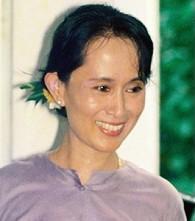Yangon - Myanmar opposition leader Aung San Suu Kyi has agreed to appeal a recent court decision that put her under house detention for the next 18 months, her attorneys said Thursday.
"We will file the appeal to the Divisional Court for Daw [Madame] Aung San Suu Kyi on Monday or Tuesday next week," Nyan Win, one of Suu Kyi's three lawyers, said after meeting with the Nobel Peace Prize laureate to discuss her appeal.
Suu Kyi, 64, who has spent 14 of the past 20 years under detention, has also requested that authorities allow her personal doctor Tin Myo Win to be allowed to visit her regularly for check-ups as was permitted under the previous rules of her detention.
On August 11, a special court set up in Yangon's Insein Prison found Suu Kyi guilty of violating the terms of her house arrest and sentenced her to three years in prison. The sentence was quickly commuted to 18 months under house detention by Myanmar's military supremo, Senior General Than Shwe.
Suu Kyi was found guilty of allowing US national John William Yettaw to swim to her lakeside home-cum-prison on May 3, where he stayed uninvited until May 5, to warn her of an assassination attempt he had envisioned.
The bizarre escapade provided a pretext for Myanmar's military regime to accuse Suu Kyi of violating the terms of her detention and to keep her out of the political picture for the next 18 months while it prepares for a general election next year, which promises to be neither free nor fair.
Yettaw, 54, was sentenced to seven years in prison but was freed on August 16 at the request of visiting US Senator Jim Webb, chairman of the US Senate's East Asia and Pacific Affairs Subcommittee.
Webb, in a rare interview with Than Shwe, also requested that Suu Kyi be released but failed to secure the opposition leader's freedom.
Suu Kyi's ongoing house detention meant that it was unlikely that her National League for Democracy opposition party, which won the last polls in 1990 but has been denied power for the past 19 years, would participate in next year's election.
It also dashed hopes that prior to the polls, the regime might open a dialogue with the democracy icon and consider amending the 2008 constitution, which essentially cements the military's control over any democratically elected government.
- (Photo AP)Protestors wave flags during a demonstration outside the Myanmar Embassy in London, Tuesday Aug. 11, 2009, to protest against the 18-month house arrest of pro-democray leader and Nobel Laureate Aung San Suu Kyi.
- (Photo AP)A child watches, during a demonstration outside the Myanmar Embassy in London, Tuesday Aug. 11, 2009, to protest against the 18-month house arrest of pro-democray leader and Nobel Laureate Aung San Suu Kyi.
A spokesman for the US embassy in Yangon, formerly Rangoon told the Associated Press that Webb was expected to spend three days in Myanmar and would visit the new administrative capital of Naypyidaw to meet government leaders.
Sen. Webb will also be the first top U.S. official to meet Myanmar’s top official, Senior Gen. Than Shwe, the man in charge of the military regime.
United States has strongly condemned the sentencing of Nobel laureate Aung San Suu Kyi to 18 months house arrest by Myanmar government. The court has first commuted her to 3 years prison term which was reduced by Than Shwe.
1991 Nobel Peace Prize winner Suu Kyi was found guilty on Tuesday of violating her house arrest by allowing an uninvited American John John Yettaw to stay at her home. Mr. Yettaw was sentenced to seven years in prison, four with hard labour. The court also sentenced Suu Kyi's two female house companions, Khin Khin Win and Win Ma Ma, to 18 months.
Myanmar, the new name for Burma until the junta change it in 1989 is ranked No.24 by Open Doors 2009 Watch List of the top 50 nations that are worst persecutors of Christians. Myanmar has been under the junta since the infamous military coup in 1962.
Christian Solidarity Worldwide, a human rights organization specialized in religious freedom around the world in a secret visit to the Burma-Thailand border in May this year said there is rampant violation of human rights and restriction of religious freedom especially those of the minority Christians.
The report uncovers that forced labour, rape, torture, the destruction of villages, crops and livestock, and the use of human minesweepers at the hands of the military regime are common in states dominated by ethnic minorities like Chin, Kachin, Karen and Karenni – who are majority Christians.
Christians make up about 4 percent of the estimated 55 million populations of which Baptists are the single largest Christian denomination. It is an overwhelmingly Buddhist country with as many as 89 percent adhering to Buddhism.
Many ethnic Christian minorities who form majority of Burmese Christians have fled the country due to rampant human rights violation and religious persecutions in the country.
The visit of Sen. Webb will be watch with anticipation by Aung San Suu Kyi supporters and the persecuted Christians.




 Bandarban: Six Arakanese youth from the Indo-Burma border area in southern Chin State were recruited by the Burmese army last week with food and other property given to their family, said a teacher from the area.
Bandarban: Six Arakanese youth from the Indo-Burma border area in southern Chin State were recruited by the Burmese army last week with food and other property given to their family, said a teacher from the area. 